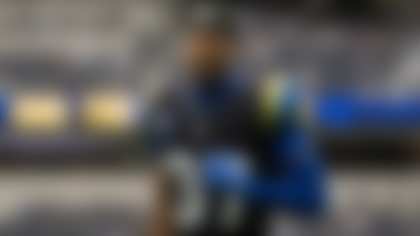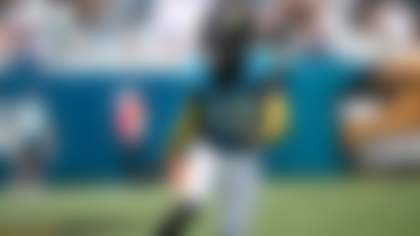NEW ORLEANS -- It's clear the NFL doesn't think it did a sufficient job of communicating with James Harrison by taking $125,000 from his wallet last season.
If the Pittsburgh Steelers' linebacker thought he was any sort of a target as a result of the four fines he drew for delivering helmet-to-helmet hits last season, he hasn't seen anything yet.
Next season (if and when it begins), Harrison will likely find himself missing some games as punishment for similar hits.
Change is not always good
The proposed rule change to move the kickoff up to the 35-yard line would alter the impact of elite returners and devalue a portion of the game, says Michael Lombardi. **More ...**
»
Baldinger:
Losing special part of game
»
Kirwan:
Lessoning value of kickoffs
»
La Canfora:
What about reseeding?
Although he wasn't specifically mentioned, the NFL Competition Committee clearly had Harrison in mind by revealing before the start of the NFL Annual Meeting it intends to crack down on repeat offenders of illegal helmet-to-helmet contact. Through last season, Harrison and most other players who violated those rules were levied hefty fines.
"Going forward, we won't have that hesitation to suspend," NFL executive vice president Ray Anderson said.
It was Rodney Harrison, who had a reputation for delivering more than his share of nasty hits as an NFL safety, who was the most vocal last season in addressing the fact that fines weren't an adequate way to deal with illegal hits. Harrison discussed the need to use suspensions as a form of discipline during and after his appearance on NBC's "Football Night in America" in Week 6, a day when there was a rash of vicious head-to-head hits, including two involving James Harrison against the Browns. Rodney Harrison said it was the only way to truly discourage such hits.
Clearly, the league was listening.
The proposal makes sense because some players -- while they might not enjoy parting with money -- view a fine as a small price to establish their hard-hitting reputations. Those reputations can lead to "dirty player" labels, as was the case for Rodney Harrison throughout his career and James Harrison last season. But they also can lead to Pro Bowl recognition and other accolades. In addition, opposing receivers tend to think twice about making a catch in the vicinity of a defender known for bone-rattling blows.
A suspension is likely to be more effective than a fine because the player not only loses a paycheck for each game he misses, but he also has to live with the extremely uncomfortable peer pressure of having let down his teammates by sitting out. Rodney Harrison said it was only then that he got the message of the severe consequences of the types of hits he was delivering.
This is all about the consequences. Helmet-to-helmet hits are extremely dangerous, and the NFL is striving to do all it can to remove them from the game. The proposed changes to make kickoffs safer and clarifications over what constitutes a "defenseless player" are important steps.
However, the willingness to hand out suspensions to repeat offenders of helmet-to-helmet contact is by far the biggest step. The NFL considered doing so last year, but felt it wasn't fair because players hadn't been given any warning before the season.
Now, they should consider themselves warned.
"There's no question this is (targeting) James Harrison and also (Patriots safety) Brandon Meriweather," one club executive said. "If you're a repeat offender, you're going to be suspended. We just can't have these sort of hits."
At one point last year, James Harrison said he seriously considered retiring because the league's repeated fines were changing the way he played and rendering him less effective. After meeting with Steelers coach Mike Tomlin, Harrison had a change of heart. He proceeded to have a strong season, helping the Steelers lead the NFL in scoring defense, rank second in total defense and reach the Super Bowl.
Ultimately, the fines -- and threat of more -- took nothing away from his game. A potential suspension would figure to be a stronger deterrent, but Harrison's game wouldn't suffer any more than it did a year ago.
The game itself, though, might be a whole lot safer.
Not ready for 'last resort'
At least two teams are known to have proposed to the NFL Competition Committee that kickoffs be eliminated from the game and replaced by offensive drives at the start of games, the half or after scores instead beginning at the 25-yard line.
Although the committee considers kickoffs a highly dangerous play (especially to the kicking team), it wasn't ready to go that far. Instead, it is proposing to do away with wedge blocking and move kickoffs back from the 30- to the 35-yard line and touchbacks from the 20 to the 25.
The committee gave the elimination of the kickoff serious thought, but viewed it as a "last resort" if the proposed rule changes for kickoffs doesn't significantly reduce injuries. There is at least one other intermediate step, such as effectively turning kickoffs into punts, with blockers and cover men being moved to their respective 40-yard lines and even closer to midfield to reduce their ability to build up speed before engaging.
Toughing it out
Jason Kelce didn't know it at the time, but the severe stomach pain and nausea he experienced at the recent NFL Scouting Combine were symptoms of appendicitis. That didn't stop the University of Cincinnati guard from taking part in all aspects of the combine, including workouts. And it didn't prevent him from recording combine bests for his position in the 40-yard dash (4.89 seconds), the 20-yard shuttle (4.14 seconds) and 3-cone drill (7.22 seconds).
"The stomach was bothering me all week; I was going from interviews (with teams) literally right to the toilet throwing up," Kelce told me during an interview on SIRIUS NFL Radio. "I tried to look as good as I could in the interviews and handle them as well as I possibly could, and I thought I ended up doing a pretty good job."
Kelce's best work, though, came on the field, despite the fact he wasn't able to get much sleep. Late one night, he contacted a physician the combine made available to participants, but there was still no diagnosis of appendicitis. Kelce, whose weight dropped to 280 pounds from his normal 295, also began feeling better by the time he was scheduled to work out and decided to give it a shot.
"For a couple of days, I started feeling better, and I thought it had run its (course)," he said. "And then, all of a sudden, it just hit me again, and this time the stomach pains were a lot worse."
About a week after the combine, Kelce checked into an emergency room and wound up undergoing an emergency appendectomy. He is still recovering and won't be able to take part in drills at Cincinnati's pro day on March 28. But one would have to think that NFL scouts are going to be impressed with the remarkable grit he demonstrated at the combine.
A scout in the making
Tennessee Titans cornerback Alterraun Verner is hardly neutral about this topic, but he offers some sound reasons why outside linebacker Akeem Ayers and safety Rahim Moore are outstanding NFL prospects beyond the fact they were his teammates at UCLA.
This is how he broke down Ayers for me during a recent radio interview:
"Ever since (Ayers) stepped on campus -- he red-shirted his first year -- I knew there was something special about him. And when he started playing as a red-shirt freshman, he was making plays (from) a reserve role, mostly in nickel packages. You would see glimpses of just greatness with that guy. When I left, when he was a red-shirt sophomore, I just put on my little pro evaluation that he was the best player on our team. I really felt like there was nothing on the defensive side of the ball that this man cannot do. He could rush the quarterback, get sacks, because he was a former defensive end, but then he has the drop-back coverage of a linebacker, and he has great hands. He can read the quarterback really well. He just makes plays, and he does it mostly off of pure instincts.
"I was looking at something about the NFL's greatest players, and there was something about Lawrence Taylor, and the things they were describing about Lawrence Taylor were very familiar to what I see in Akeem Ayers. I'm not saying that he would get to that level, being that Lawrence Taylor is definitely a special player, but they had very similar qualities that people saw in L.T. that I've seen in Ayers. If he works hard enough, which I believe he can, he could be that type of player and have that type of impact on whatever team he goes to."
This is what Verner had to say about Moore, with whom he played in the secondary for two seasons:
"A very, very gifted football player. He has great footwork; some really, really, really quick feet. He is a student of the game. He always is trying to improve and get better. I'd see him in the film room all the time. In fact, I caught him sleeping in our film room at least two or three times when I was playing there. He's a playmaker. If the ball's in his area, he's going to go try to get the ball before (anyone else) gets it. I have no doubt he's going to be successful because he's going to be a worker. He's never been afraid to give a little extra, (whether) it's in the weight room, out on the field. That's what I really admired about him."
Value of offseason workouts?
At least one former longtime NFL assistant coach doesn't think the league would suffer a whole lot with players missing workouts at team facilities during the lockout.
"That's mainly because nobody does any coaching (of fundamentals) anymore," said the coach, who requested anonymity.
He said as long as players maintain good physical condition, which is something most address on their own during the offseason anyway, they should be able to weather the time away. Otherwise, he said, the focus in organized team activities has little to do with helping players improve their skills.
"Everybody just works on how to (bleep) each other (with schemes)," the coach said. "You spend most of your time working on that stuff, so I don't know how much of a difference it really makes for guys to be missing all of this time in the offseason. And whatever you do work on in the offseason just has to be repeated in training camp. By then, you pretty much know what your team is going to look like."
Not everyone agrees. Saints linebacker Scott Shanle, for one, was recently quoted as saying that if players were unable to take part in offseason drills with their teams by mid-April, on-field performance would suffer during the season.
Follow Vic Carucci on Twitter @viccarucci.



